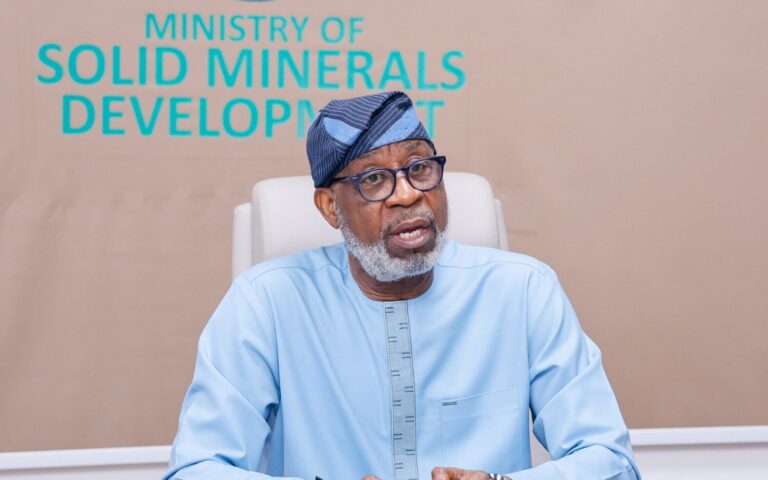Nigeria’s efforts to diversify its economy are gaining renewed momentum, with the country’s solid minerals sector emerging as a promising frontier for foreign investment. According to the Minister of Solid Minerals Development, Dr. Dele Alake, Chinese companies have injected over $1.3 billion into Nigeria’s lithium processing industry since 2023 — a landmark move that underscores global confidence in Nigeria’s growing mineral potential.
Speaking at the 2025 China Mining Conference in Tianjin, themed “Connect and Collaborate, Co-Build and Co-Share,” Dr. Alake highlighted how partnerships between Nigeria and leading Chinese investors are transforming the nation’s mining landscape.
Lithium: The New Oil of a Green Future
Lithium, an essential component in electric vehicle batteries and renewable energy storage, has become one of Nigeria’s most sought-after resources. Global demand is soaring, and Nigeria’s untapped reserves are now attracting attention from major players such as Canmax Technology, Jiuling Lithium, Avatar New Energy Nigeria Company, and Asba.
“These companies have collectively invested over $1.3 billion since September 2023,” Dr. Alake stated. “Beyond capital inflow, these investments are reshaping our industrial framework through improved infrastructure, technology transfer, and human capacity development.”
The minister noted that ongoing joint ventures between Chinese and Nigerian firms are empowering local engineers and technicians with advanced technical skills — a key step toward achieving Nigeria’s vision of value-added mineral processing rather than raw exportation.
Reforms That Inspire Investor Confidence
Dr. Alake emphasized that Nigeria’s mining environment is now more transparent, secure, and investor-friendly than ever before. Through a series of policy reforms, the federal government is working to transform the solid minerals sector into a globally competitive and sustainable industry.
Among the notable reforms are:
-
Deployment of Mining Marshals and Satellite Surveillance Systems to combat illegal mining and safeguard licensed operations.
-
Electronic Mining Cadastre (eMC+) and the Nigerian Mineral Resources Decision System (NMRDS) — both digital platforms designed to simplify licensing, streamline transactions, and promote transparency.
-
Strengthening the Solid Minerals Development Fund (SMDF) to finance early-stage exploration and reduce investor risk.
“These initiatives are not just policy shifts — they are part of a broader vision to ensure that Nigeria’s mineral wealth contributes to national development and the global green economy,” the minister explained.
Positioning Nigeria for a Global Role
As the Chair of the Africa Minerals Strategy Group (AMSG), Dr. Alake reaffirmed Nigeria’s commitment to building a continental model for responsible and profitable mining. He stressed that the country’s focus extends beyond extraction to include processing, value addition, and industrial utilization.
“Our goal is to create a complete value chain — from exploration to production — that supports clean energy, stimulates industrial growth, and generates employment for our youth,” he said.
He added that Centres of Excellence in Geosciences and Mining Skills are being expanded to train a new generation of Nigerian professionals equipped for modern mining challenges.
An Open Call to Global Investors
With the world’s energy transition accelerating, Nigeria is positioning itself as a strategic partner for investors seeking sustainable opportunities in mineral development. Dr. Alake extended a warm invitation to global stakeholders to explore Nigeria’s vast reserves of lithium, gold, barite, lead-zinc, and rare earth elements.
“We are not only seeking investors — we are seeking partners,” he emphasized. “Partners who share our vision of building a resilient, inclusive, and technologically advanced mining industry that benefits both people and planet.”
Beyond Extraction: Toward Economic Transformation
The government’s long-term strategy goes beyond exporting minerals; it aims to develop local processing industries capable of producing lithium batteries, electronic components, and other high-value products. This approach, according to Dr. Alake, will reduce Nigeria’s dependence on oil revenues and strengthen its manufacturing base.
“Our vision is to establish a sustainable and competitive mineral value chain that becomes a catalyst for industrial transformation,” he concluded.
A Turning Point for Nigeria’s Economic Future
The influx of Chinese capital marks a defining moment for Nigeria’s solid minerals sector. With robust reforms, strategic partnerships, and a clear focus on technology and value addition, the country is charting a new economic course — one where its mineral wealth powers both domestic development and global innovation.
If fully harnessed, this $1.3 billion investment wave could be the spark that turns Nigeria’s solid minerals from potential into prosperity.

